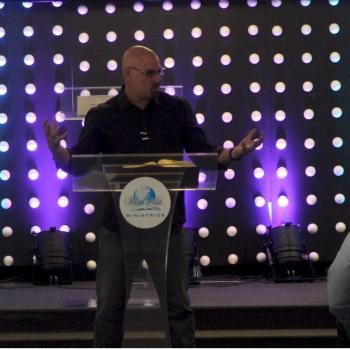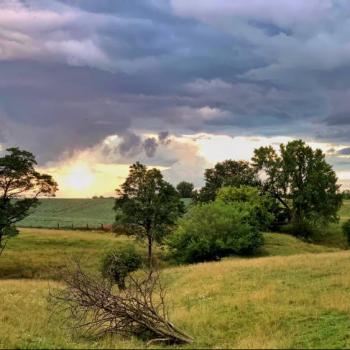I was 14 years old—"fourteen and one-half" I'm sure I would have insisted at the time—when I was baptized a member of The Church of Jesus Christ of Latter-day Saints. It has been so long ago that I no longer feel like a convert. But it remains important to my self-understanding that I am a convert.
There are many reasons that is important to me, but perhaps the primary one is that I was converted in spite of myself. I had studied with the missionaries for most of a year and had finally more-or-less agreed to be baptized, but I wasn't yet a convert. Conversion came before baptism in a sudden, surprising, and unbidden spiritual experience. I didn't hear a voice, but I had a small taste of what Paul experienced on the road to Damascus (Acts 9:1-8; 22:3-11) and that changed my life forever. My conversion demonstrated the importance of divine grace.
The LDS Church teaches that baptism by immersion is required for salvation (2 Nephi 31:5; Doctrine & Covenants 39:6), so we baptize all new converts. We take Mark 16:15-16 literally: "Go ye into all the world, and preach the gospel to every creature. He that believeth and is baptized shall be saved; but he that believeth not shall be damned." We baptize even those converts who have already been baptized in another Christian church because we believe that such ordinances require the authority of the priesthood that was restored through Joseph Smith. And we do proxy baptisms for our dead ancestors to give them the opportunity to be baptized if they so choose.
Mormon teaching is that little children are redeemed through the mercy of the Savior, Jesus Christ (Moroni 8:11-12; D&C 29:46-47). Revelation has specified the earliest age for baptism as eight years (D&C 68:27), so that is usually when the child of an LDS family will be baptized.
In the last twelve to eighteen months, several of my grandchildren have been baptized. It is a time of introspection for them. Their parents and congregational leadership spend time helping them to prepare, talking with them about the meaning of baptism, about the need for faith and repentance.
What that means to an 8-year-old is not what it means to an 18-year-old, which is not what it means to a 38- or 58-year-old. But it is surprising the seriousness with which someone that young can make the decision and how much they can understand about what they are choosing to do. For each of my grandchildren, counseling with their parents and bishop before baptism has been their first real introduction to adult life, and they have responded to that introduction with study, prayer, and thoughtfulness. Their sincerity has been impressive.
Those preparing for baptism, whether adults or children, are taught that they must recognize their sins and confess them to God (Alma 7:14) and that they must exercise faith in Jesus Christ for salvation (Acts 4:10-12; Mosiah 3:17; Alma 7:14; Moroni 7:26).
Latter-day Saints teach that through baptism we enter into covenant relation with God: we agree to take the name of Jesus Christ on ourselves. (That explains the name of the Church—The Church of Jesus Christ of Latter-day Saints—and the Mormon intransigence when it comes to insisting that we are Christians. To agree that we are not would be to violate the covenant we make at baptism.) We also agree to keep God's commandments. And we agree to serve him until the end of our lives.
As one of the revelations received by Joseph Smith says:
All those who humble themselves before God, and desire to be baptized, and come forth with broken hearts and contrite spirits, and witness before the church that they have truly repented of all their sins, and are willing to take upon them the name of Jesus Christ, having a determination to serve him to the end, and truly manifest by their works that they have received of the Spirit of Christ unto the remission of their sins, shall be received by baptism into his church. (D&C 20:37)





